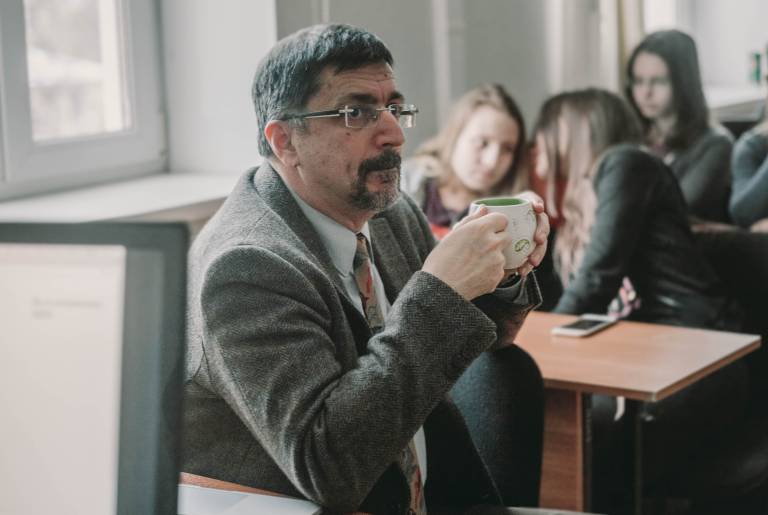How to Research the Russian Language in Times of War?
01 November 2023, 4:00 pm–6:00 pm

A SSEES Culture and Society in Modern Russia seminar with Prof Gasan Gusejnov. Please note that this event will be delivered in Russian
This event is free.
Event Information
Open to
- All
Availability
- Yes
Cost
- Free
Organiser
-
SSEES
Location
-
Room 347UCL School of Slavonic and East European Studies16 Taviton streetLondonWC1H 0BW
"How to approach the research of the Russian language?" - is the question that all scholars have been asking themselves since the war in Ukraine began. Official Russian propaganda claimed that the war in Ukraine was being waged to save the Russian language and its speakers from "Ukrainian nationalists". Immediately after the outbreak of the war, it became clear that most of the victims and refugees from Ukraine were precisely Russian-speaking or bilingual residents of Eastern Ukraine. The lies underlying Russian policy have led the most radical sections of the Ukrainian population to declare the Russian language itself a source of violence and hate politics. Therefore, every linguist studying contemporary Russian is forced to make a cultural-political choice, defining for himself the purpose of own study.
The official discourse of contemporary Russia is a discourse of hostility and hatred towards the outside world, a discourse of Russia's spiritual superiority over the modern Western world. At the same time, such discourse actively uses Russia's cultural heritage to achieve the regime's goals. That is why a neutral and apolitical study of the Russian language is impossible today.
About the speaker:
Gasan Guseinov is Founder and Professor of the Free University, Riga, Latvia.
He graduated from the Department of Classical Languages at Moscow State University. He has taught at universities in Russia (Moscow State University, Higher School of Economics), Germany, the USA and Switzerland. Author of several books on ancient Greek literature, such as "Plato's Dramaturgical Method", "Aristophanes", "Aeschylus' 'Oresteia'. Figurative Modelling of Action", as well as books on modern socio-linguistics: "Map of our Motherland: Ideologeme between Word and Body"; "Materials for the Russian Social and Political Dictionary of the 20th Century"; "Soviet Ideologemes in Russian Discourse of the 1990s", as well as "Zeros on the Tip of the Tongue: A Short Guide to Russian Discourse".
Please note that this event will be delivered in Russian.
«Как исследовать русский язык во времена войны?»
«Как подходить к изучению русского языка?» — вопрос, который задают себе все исследователи после начала войны в Украине. Официальная российская пропаганда объявила, что война в Украине ведется ради спасения русского языка и его носителей от «украинских националистов». Сразу после начала войны выяснилось, что большинство жертв нападения и беженцев из Украины – это как раз русскоязычные или двуязычные жители Восточной Украины. Ложь, лежащая в основе российской политики, привела к тому, что наиболее радикальные слои населения объявили сам русский язык источником насилия и политики ненависти. Поэтому каждый лингвист-исследователь, изучающий современный русский язык языка, принужден сделать культурно-политический выбор, определив для себя цель работы.
Официальный дискурс современной России — это дискурс вражды и ненависти к окружающему миру, дискурс духовного превосходства России над современным западным миром. При этом такой дискурс активно использует для достижения целей режима культурное наследие России. Вот почему сегодня нейтральное и аполитичное, изучение русского языка сегодня невозможно.
Гасан Гусейнов — Основатель и Профессор Свободного Университета, Рига, Латвия.
Он окончил отделение классических языков МГУ. Преподавал в университетах в России (МГУ, ВШЭ), Германии, США и Швейцарии. Автор нескольких книг по древне-греческой литературе, как "Драматургический метод Платона", "Аристофан", "'Орестея' Эсхила. Образное моделирование действия", а также книг по современной социо-лингвистике: "Карта нашей Родины: идеологема между словом и телом"; "Материалы к русскому общественно-политическому словарю XX в."; "Советские идеологемы в русском дискурсе 1990-х", а также "Нулевые на кончике языка: Краткий путеводитель по русскому дискурсу".
 Close
Close

